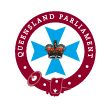-
Work of committees
- Upcoming Committee Business
- About Committees
- Training Seminar - Committees@Work
- Committees (10)
- Committees Glossary
- Estimates Hearings
-
Inquiries
- Live and Archived Broadcasts
- Publications
- Guidelines (4)
- Subscribe
- Former Committees (67)
- 30 Year Release
- Past Alert Digest and Legislation Alert Indexes
- Ten Year Anniversary
Consideration of Auditor-General Report 7: 2024-25 - Managing Queensland’s regional water quality
Overview
Role of the Auditor-General
The role of the Auditor-General is to provide Parliament with independent assurance of public sector accountability and performance. This is achieved through reporting to Parliament on the results of its financial and performance audits.
About the Auditor-General Report
| View: | Auditor-General Report 7: 2024-25 - Managing Queensland’s regional water quality |
| View: | Report summary |
The report examines how effectively 4 regional and remote councils supply safe drinking water to their communities. It also examines how the Department of Local Government, Water and Volunteers (the department) regulates drinking water quality across the state.
Auditor-General recommendations
The Auditor-General makes 11 recommendations that are aimed at providing safe drinking water and regulating drinking water quality.
Recommendations directed to all councils are that they:
1. assess their record keeping of essential activities for managing drinking water quality to ensure they are—
- maintaining up-to-date standard operating procedures
- recording maintenance and inspection results
- developing schedules and timelines for upcoming periodic activities
- recording verification monitoring (regular water testing) results and analysis of water quality trends.
2. ensure appropriate oversight of compliance with management plans, risks to drinking water quality, improvement actions, and recommendations from independent audits
3. assess and address identified capability and expertise gaps
4. test their emergency response plans periodically for high-risk events, and train staff in how to respond.
Recommendations directed to the Department of Local Government, Water and Volunteers are that it:
5. improves coordination with its water regulation and local government functions, and across agencies by developing mechanisms to coordinate and share information, and promote workforce and
infrastructure planning with providers.
6. develops a pathway for adopting health-based targets by
- assessing the regulatory impact of fully implementing the targets and the public health risks of not adopting them. This should include identifying the costs and benefits
- publishing an implementation plan with a timeline and communication strategy – to give councils more clarity for their infrastructure and operational planning.
7. improves its risk-based approach to assessing and managing providers by—
- ensuring it completes its annual compliance risk assessment of providers
- recording more detailed documentation of the sources of information and explanations for the risk rating it gives to each provider when assessing whether they are likely to comply with their legislative obligations
- aligning its compliance risk assessments and plan to direct and prioritise resources
- developing further specific actions to manage high-risk providers.
8. enhances its workforce planning to ensure it has sufficient resources to deliver its compliance activities, meet the demand for responding to incidents, and review the providers’ audit reports and
annual reports in a timely manner
9. evaluates its response to non-compliance and assesses the effectiveness of outcomes from its actions
10. enhances the data it collects on drinking water quality and implements a process to monitor and report on water quality
11. improves how it measures its performance and reports externally by—
- developing specific performance measures that align with its water quality outcome in its strategic plan
- setting clear benchmarks or targets for its performance measures and assessing its performance against these
- changing its approach to calculating non-compliance in its service delivery statements.
Referral to Committee
Standing Order 194B provides that the Committee of the Legislative Assembly shall as soon as practicable after a report of the Auditor-General is tabled in the Assembly refer that report to the relevant portfolio committee for consideration.
The committee is responsible under section 94 of the Parliament of Queensland Act 2001 for assessing the integrity, economy, efficiency and effectiveness of government financial management by examining government financial documents and considering reports of the Auditor-General.
The Committee of the Legislative Assembly referred this Auditor-General report to the committee on 20 February 2025.
Public Briefing
A public briefing was held with the Queensland Audit Office on Wednesday, 11 June 2025 at 10:30am – program - broadcast - transcript
Related Publications
| Publication Details | Type | Published Date | Tabled Date | Committee Name |
|---|
